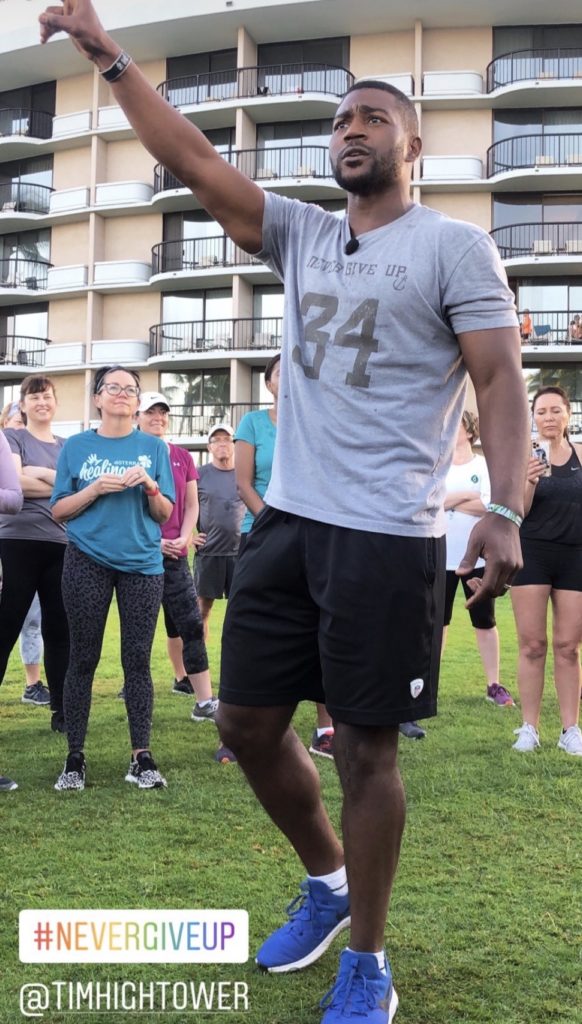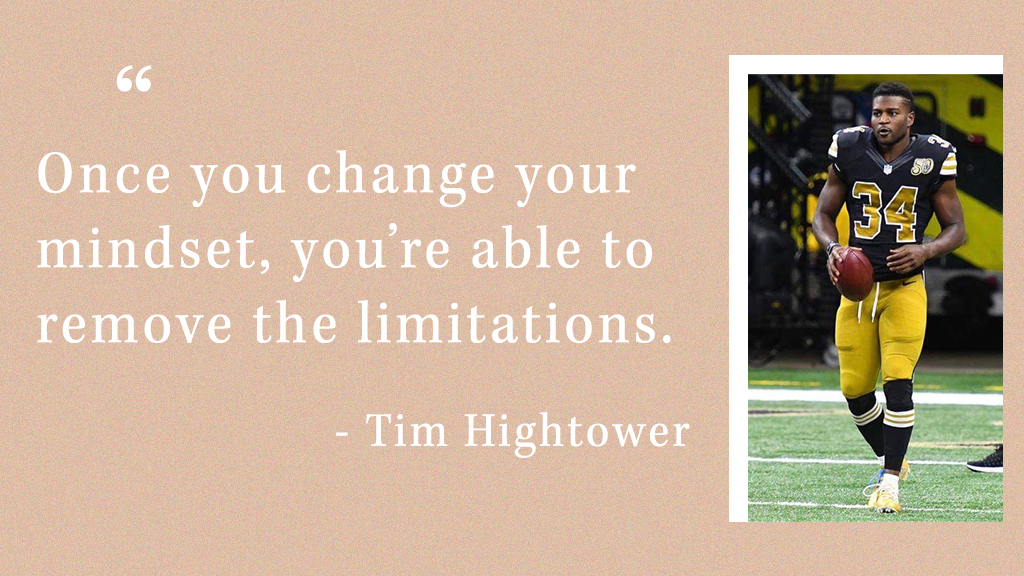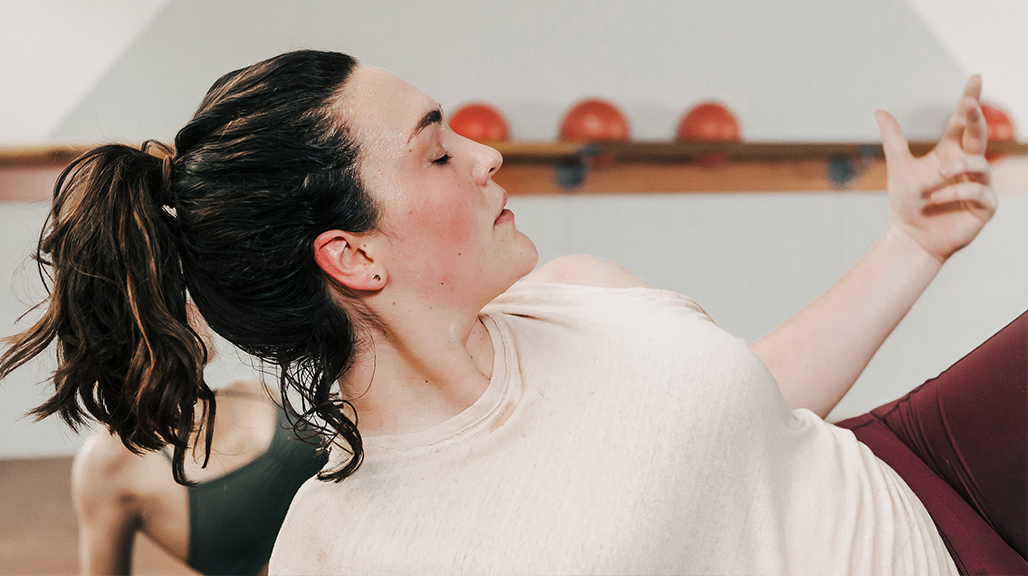Connect
Former NFL Player Tim Hightower Shares How He’s Redefining Success
If you know barre3, you know about our vision to redefine what success in fitness means—it’s why Sadie and Chris Lincoln launched the company in 2008, and it continues to be our North Star today. So when we learned that former NFL player Tim Hightower had a similar mission, we knew we needed to connect with him.
From an early age, Hightower knew he wanted to play professional football, and he built his whole life around his dream. His hard work paid off: After playing football at the University of Richmond, he went on to play for the Arizona Cardinals, the New Orleans Saints, and the Washington Redskins. But while playing for the Redskins, he suffered what he was told would be a career-ending injury, and his life changed in a flash. We talked to Hightower about what it was like to have his dream taken away from him, how he’s redefining what success means to him, and how a small but profound piece of advice from his mom has guided him every step of the way.
Join Hightower and Sadie for a LIVE Q+A on Instagram this Tuesday at 10 a.m. PT.
BARRE3: Before we dive into your injury, let’s talk about how you made it to the NFL in the first place. That’s huge—a pipe dream for so many kids but a reality for a very few. Where did you find your drive?
HIGHTOWER: I knew from when I was in fifth grade that I wanted to play professional football, but it was something my mom said to me in high school that helped me find my focus. She said, “Son, have a purpose behind everything that you do.” At that point in my life, I was searching for meaning, for answers, for identity. We had moved around a lot, and everything was out of my control. When my mom said that to me, for the first time I felt like I could actually be in control of the choices I made, and I felt like those choices actually mattered.
After that, I became obsessed with the idea of having a purpose behind everything I did. I’d ask myself what the purpose was behind certain friendships, the classes I took, everything. To my mind, it all had to point to this goal of being a professional athlete.
BARRE3: It sounds like her advice helped things crystalize for you.
HIGHTOWER: Exactly. To this day that’s one of the most important lessons I’ve learned in my life. When you ask yourself that “why,” it changes how you live your life. It gave me a process by which I could make decisions.
BARRE3: Clearly it paid off! You had great success playing both in college and for the NFL. About halfway through your first season with the Redskins, you tore your ACL. What was your initial reaction?
HIGHTOWER: I was in denial. I literally felt like I was in a dream, like someone would wake me up any minute. At first, I refused to get surgery—I just didn’t want to believe it was happening. I had done everything right: I took care of my body, I worked hard, I persevered, I went to college. I had just been traded back to the Redskins, my home turf, and I was celebrated by my church group, my friends, my family, my old coaches, teachers. Everyone was excited for me. This was going to be the platform from which everything else took off—and the next thing I know, at 24 years old, I’m being told I might have to reconsider everything.
BARRE3: That’s such an incredible blow. How did you get past the denial?
HIGHTOWER: It was a process. After denial, I was frustrated, and then sad. I had gone from being an athlete in the peak shape of my life to being in pain every day. I had five different surgeries. I started to ask myself, is this what life is going to be? Was it worth working toward a dream from fifth grade to age 25 if I now have to live my life in constant pain? I didn’t have any money, I was in pain all the time, and my previous outlet—working out—wasn’t possible.
BARRE3: We talk a lot in barre3 about how it can be hard to let go of an attachment to our former selves. How did you get past that and start to forge new ground?
HIGHTOWER: I went back to the beginning. Before all these people knew me, before all the money, before the expectations, who was I, and what got me here? I was a kid with a dream, a passion, and a work ethic. I realized, no matter where I go, that mission is going to stay true. I’m the one constant in the whole story. That inspired me. I didn’t have 20 mentors growing up, but somehow I figured it out. I realized, maybe I can do it again.

BARRE3: It sounds like you went back to your mother’s advice about having a purpose.
HIGHTOWER: One hundred percent. I thought, so what is it now? What excites me now, and what gives me hope for tomorrow? I started writing all of that down, just like I did when my mother first told me to have a purpose. I also relied on the people who had been with me from the beginning: my high-school coach, my parents, my church group. It was important to go back to that foundation. You can’t forget that core that got you where you are.
I realized I really wanted to understand how people make it through in the face of adversity, so I started reading, researching, seeking out other people who’ve been through something like this. I studied athletes, business leaders, all kinds of people. I was recovering, so I spent a lot of time watching documentaries, watching YouTube stories, reading articles. That’s how I discovered Sadie and barre3.
BARRE3: Did this research influence your own recovery?
HIGHTOWER: Absolutely. I started to understand that I needed to redefine what health and wellness meant to me. Everything in the NFL is so instinctive—you train for years to be able to act on instinct. But now my body was different, and I had to open my mind to other training methods that would help me heal, that would be more productive for my body. I started swimming more. I worked on flexibility. It was all about relearning and retraining my body. I’d ask myself: What’s my purpose? And the answer was, I want to keep moving, I want to be well, I want to be fit.
BARRE3: Did that approach help you find more success?
HIGHTOWER: One hundred percent. Once you change your mindset, you’re able to remove the limitations.
Thank you so much for talking with us, Tim! Join us in redefining success in fitness by starting your 15-day free trial of barre3 online or finding your local studio.
If you know barre3, you know about our vision to redefine what success in fitness means—it’s why Sadie and Chris Lincoln launched the company in 2008, and it continues to be our North Star today. So when we learned that former NFL player Tim Hightower had a similar mission, we knew we needed to connect with him.
From an early age, Hightower knew he wanted to play professional football, and he built his whole life around his dream. His hard work paid off: After playing football at the University of Richmond, he went on to play for the Arizona Cardinals, the New Orleans Saints, and the Washington Redskins. But while playing for the Redskins, he suffered what he was told would be a career-ending injury, and his life changed in a flash. We talked to Hightower about what it was like to have his dream taken away from him, how he’s redefining what success means to him, and how a small but profound piece of advice from his mom has guided him every step of the way.
Join Hightower and Sadie for a LIVE Q+A on Instagram this Tuesday at 10 a.m. PT.
BARRE3: Before we dive into your injury, let’s talk about how you made it to the NFL in the first place. That’s huge—a pipe dream for so many kids but a reality for a very few. Where did you find your drive?
HIGHTOWER: I knew from when I was in fifth grade that I wanted to play professional football, but it was something my mom said to me in high school that helped me find my focus. She said, “Son, have a purpose behind everything that you do.” At that point in my life, I was searching for meaning, for answers, for identity. We had moved around a lot, and everything was out of my control. When my mom said that to me, for the first time I felt like I could actually be in control of the choices I made, and I felt like those choices actually mattered.
After that, I became obsessed with the idea of having a purpose behind everything I did. I’d ask myself what the purpose was behind certain friendships, the classes I took, everything. To my mind, it all had to point to this goal of being a professional athlete.
BARRE3: It sounds like her advice helped things crystalize for you.
HIGHTOWER: Exactly. To this day that’s one of the most important lessons I’ve learned in my life. When you ask yourself that “why,” it changes how you live your life. It gave me a process by which I could make decisions.
BARRE3: Clearly it paid off! You had great success playing both in college and for the NFL. About halfway through your first season with the Redskins, you tore your ACL. What was your initial reaction?
HIGHTOWER: I was in denial. I literally felt like I was in a dream, like someone would wake me up any minute. At first, I refused to get surgery—I just didn’t want to believe it was happening. I had done everything right: I took care of my body, I worked hard, I persevered, I went to college. I had just been traded back to the Redskins, my home turf, and I was celebrated by my church group, my friends, my family, my old coaches, teachers. Everyone was excited for me. This was going to be the platform from which everything else took off—and the next thing I know, at 24 years old, I’m being told I might have to reconsider everything.
BARRE3: That’s such an incredible blow. How did you get past the denial?
HIGHTOWER: It was a process. After denial, I was frustrated, and then sad. I had gone from being an athlete in the peak shape of my life to being in pain every day. I had five different surgeries. I started to ask myself, is this what life is going to be? Was it worth working toward a dream from fifth grade to age 25 if I now have to live my life in constant pain? I didn’t have any money, I was in pain all the time, and my previous outlet—working out—wasn’t possible.
BARRE3: We talk a lot in barre3 about how it can be hard to let go of an attachment to our former selves. How did you get past that and start to forge new ground?
HIGHTOWER: I went back to the beginning. Before all these people knew me, before all the money, before the expectations, who was I, and what got me here? I was a kid with a dream, a passion, and a work ethic. I realized, no matter where I go, that mission is going to stay true. I’m the one constant in the whole story. That inspired me. I didn’t have 20 mentors growing up, but somehow I figured it out. I realized, maybe I can do it again.

BARRE3: It sounds like you went back to your mother’s advice about having a purpose.
HIGHTOWER: One hundred percent. I thought, so what is it now? What excites me now, and what gives me hope for tomorrow? I started writing all of that down, just like I did when my mother first told me to have a purpose. I also relied on the people who had been with me from the beginning: my high-school coach, my parents, my church group. It was important to go back to that foundation. You can’t forget that core that got you where you are.
I realized I really wanted to understand how people make it through in the face of adversity, so I started reading, researching, seeking out other people who’ve been through something like this. I studied athletes, business leaders, all kinds of people. I was recovering, so I spent a lot of time watching documentaries, watching YouTube stories, reading articles. That’s how I discovered Sadie and barre3.
BARRE3: Did this research influence your own recovery?
HIGHTOWER: Absolutely. I started to understand that I needed to redefine what health and wellness meant to me. Everything in the NFL is so instinctive—you train for years to be able to act on instinct. But now my body was different, and I had to open my mind to other training methods that would help me heal, that would be more productive for my body. I started swimming more. I worked on flexibility. It was all about relearning and retraining my body. I’d ask myself: What’s my purpose? And the answer was, I want to keep moving, I want to be well, I want to be fit.
BARRE3: Did that approach help you find more success?
HIGHTOWER: One hundred percent. Once you change your mindset, you’re able to remove the limitations.
Thank you so much for talking with us, Tim! Join us in redefining success in fitness by starting your 15-day free trial of barre3 online or finding your local studio.











0 people have left a comment. Join the conversation!
View Comments